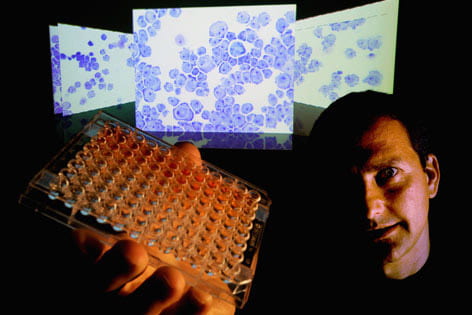Biologists attack leukemia
UC Irvine biologists are on the attack against leukemia. A recent study by UCI scientists found a new way to combat a subtype of acute lymphoblastic leukemia that could mitigate side effects and improve cure rates.

UC Irvine biologists are on the attack against leukemia.
A recent study by UCI scientists found a new way to combat a subtype of acute lymphoblastic leukemia that could mitigate side effects and improve cure rates.
This cancer subtype – Philadelphia chromosome-positive acute lymphoblastic leukemia – afflicts about 1,500 new patients in the United States each year and has a poor prognosis because it does not respond well to current therapies.
David Fruman and Dr. Michael Lilly found that leukemia cells die quickly when two enzymes that work together to promote cell division are blocked.
The scientists found that a chemical compound called PI-103 inhibited both enzymes and killed mouse and human leukemia cells in laboratory experiments. Treatment of leukemia cells with an existing chemotherapy drug and PI-103 was more effective than either treatment alone.
PI-103 and related drugs are in clinical trials for various cancers, but this study is the first to demonstrate a possible use in leukemia.
“Acute lymphoblastic leukemia is treated with various combinations of chemotherapy drugs or by bone marrow transplantation,” said Fruman, Center for Immunology associate director. “Some of the treatments have severe side effects, and disease relapse is unacceptably high.”
“These new enzyme-inhibitor drugs eventually could supplement this treatment, reducing side effects and providing longer remissions and higher cure rates,” said Fruman, also a molecular biology & biochemistry associate professor.
Lilly is affiliated with the Chao Family Comprehensive Cancer Center. Graduate students Matthew Janes and Michael Kharas also worked on the study, which was published in the Journal of Clinical Investigation.
